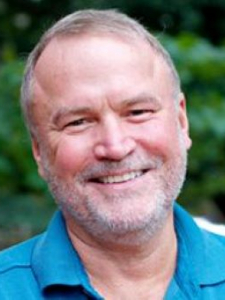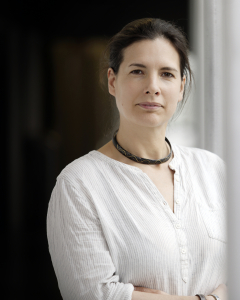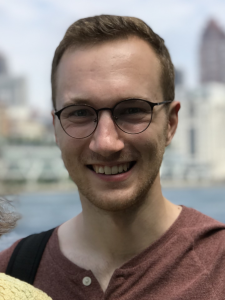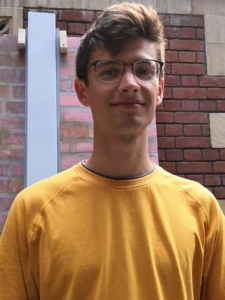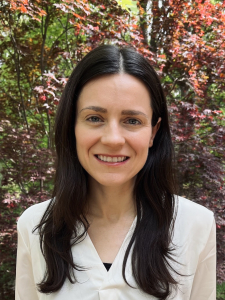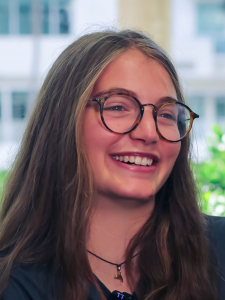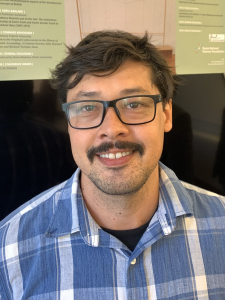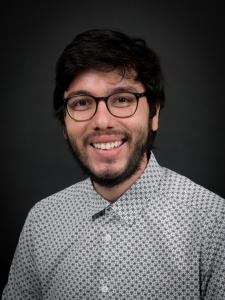The Center for the History of Political Economy at Duke University hosted its annual Summer Institute using a research workshop format on June 19-22, 2023. We invited young scholars (doctoral students and those with recently awarded PhDs) to apply.
The goal of the Summer Institute was to allow young scholars working in the history of economics (broadly defined) to improve their manuscripts and to get practice presenting their work. Participants arrived on Monday June 19 in time to attend a welcome dinner. Sessions took place on Tuesday and Wednesday. Participants departed the morning of Thursday, June 22. This allowed those who wished to attend the History of Economics Society meeting in Vancouver, which ran from June 22- 25, to do so. Four of them attended the HES meetings.
The papers that were presented were as follows:
- Jon Cooper, Stanford University, "International Collusion and Disequilibrium: Gerard de Malynes and Sixteenth-Century Foreign Exchange"
- Philip-Emmanuel Aubry, McGill University, "Max Weber as an Economist: Sozialökonomik and the Politics of Theory"
- Lúcia Centurião, São Paulo School of Economics, "A Pupil and the Tough Assignment: Monetary Issues and the Walrasian General Equilibrium Theory"
- Hannah Glasson, Virginia Tech, "Reconsidering Hayek's Environmental Views"
- Mirek Tobiáš Hošman, University of Bologna, Paris City University, ""The Most Important Research Project": The World Bank Economists and the Commodity Problem of International Development in the 1960s"
- Lisa Kinspergher, Duke University, "Mirages of Equilibrium: the Philosophical Journey of William H. Riker and the Birth of Positive Political Theory"
- Conrado Krivochein, Fluminense Federal University (UFF), "A Contribution to the Critique of National Accounting: Expanding John Maynard Keynes's Criticism of Colin Clark's National Income Estimates to the Present Use of GDP
- Nestor Lovera Nieto, Université de Reims Champagne-Ardenne, "Revisiting the Role of Value Judgements in Arrow's Impossibility Theorem"
- Raphaël Orange-Leroy, CY Cergy Paris University - University Paris 1 Panthéon-Sorbonne, "UNCTAD Experts as an Intellectual Basis for Developing Countries' Involvement in the Reform of the International Monetary System (1965-1967)"
- Emily Tivoli, University of Toronto, "the Law and Economics of John R. Commons"
The HOPE Center thanks everyone involved for making the Summer Institute a big success.
CHOPE Summer Institute 2023
June 19-21
(All times U.S. Eastern Day Light Time)
Monday, June 19
6:00 pm Meet in the Lobby of the Washington Duke Hotel
6:30 pm Welcome Barbecue Dinner, Center for the History of Political Economy, Social Sciences Building
Tuesday, June 20 (all sessions to be held in Room 327, Social Sciences Building)
9:00 - 9:20 Welcome and Introductions
9:20 - 10:30 Session I - Jon Cooper
10:30 - 10:40 Break
10:40 - 11:50 Session II - Philip Emmanuel Aubry
11:50 - 1:00 Lunch
1:00 - 2:10 Session III - Lúcia Centurião
2:10 - 2:20 Break
2:20 - 3:30 Session IV - Emily Tivoli
3:30 - 3:40 Break
3:40 - 4:50 Session V - Conrado Krivochein
4:50 - 6:00 Reception in the HOPE Center
Wednesday, June 21 (all sessions to be held in Room 327, Social Sciences Building)
9:30 - 10:40 Session I - Raphaël Orange-Leroy
10:40 - 10:50 Break
10:50 - 12:00 Session II - Mirek Tobiáš Hošman
12:00 - 1:10 Lunch
1:10 - 2:20 Session III - Hannah Glasson
2:20 - 2:30 Break
2:30 - 3:40 Session IV - Lisa Kinspergher
3:40 - 3:50 Break
3:50 - 5:00 Session V - Nestor Lovera Nieto
5:00 - 6:00 Reception in the HOPE Center
Thursday, June 22
Participants depart Washington Duke by 12 noon
Bruce Caldwell is a Research Professor of Economics and the Director of the Center for the History of Political Economy at Duke University. He is the author of Beyond Positivism: Economic Methodology in the 20th Century (1982), of Hayek's Challenge: An Intellectual Biography of F. A. Hayek (2004), and with Hansjoerg Klausinger, of Hayek: A Life 1899-1950 (2022). Since 2002 he has been the General Editor of The Collected Works of F. A. Hayek, a multi-volume collection of Hayek’s writings whose final volume appeared in 2022. A past president of the History of Economics Society and of the Southern Economic Association, when he's not working on Hayek, he doesn't know what to do, but sometimes he fills his time with tennis and golf.
Steve G. Medema is the George Family Research Professor in the Department of Economics at Duke University and the Associate Director of the Center for the History of Political Economy. He is the author of The Hesitant Hand: Taming Self-Interest in the History of Economic Ideas (Princeton, 2009), Economics and the Law: From Posner to Post Modernism and Beyond (Princeton, 2006), and The Economics Book: From Xenophon to Cryptocurrency, 250 Milestones in the History of Economics (Sterling, 2019). He currently serves as the general editor of the Oxford Studies in the History of Economics book series, published by Oxford University Press, and was editor of the Journal of the History of Economic Thought from 1999 to 2008. Dr. Medema's current research project explores the history of the use of the Coase theorem in economics, law, and beyond.
Jeff Biddle Jeff Biddle is a professor of economics at Michigan State University. His research in the history of economics has for the most part dealt with various aspects of economics and the economics profession in the 20th century US. He is a past president of the History of Economics Society and author of Progress Through Regression: The Life Story of the Empirical Cobb-Douglas Production Function. His recent papers have looked at the nature of empirical economic research in the early to mid-twentieth century. Prof. Biddle is also a labor economist, and in his current project is using wage data collected by the US Bureau of Labor statistics in the early 20th century to assess the impact of legislated immigration restrictions on the wages of unskilled labor.
Beatrice Cherrier is a historian of Economics at the Centre National de la Recherche Scientifique (CNRS), affiliated with CREST and Ecole Polytechnique, France. She researches the history of the applied turn in economics from the 1970s onwards. This has led her to investigate the development of economics in engineering-oriented universities such as MIT and Stanford, the status of women in the economics profession, the uses of models in policy spheres, in particular central banks, and the epistemologies and computational practices developed in specific subfields (urban economics, public economics, macroeconomics).
Philip Emmanuel Aubry is a fourth-year PhD candidate in Political Science at McGill University. His research interests lie at the intersection of the history of ideas, intellectual sociology, and political theory. His dissertation interrogates the links between social science methodology and politics in the works of Max Weber, Joseph Schumpeter, and Karl Polanyi.
Lúcia Centurião recently obtained her PhD in economics from the University of São Paulo. She was a visiting researcher at the Department of History at Columbia University and the History of Political Economy Center at Duke University. She works on the dissemination of the general equilibrium theory at the beginning of the twentieth century, studying, for example, the theory’s relation with the development of statistical economics. Currently, she teaches Economic History and History of Economic Thought at the São Paulo School of Economics of the Getulio Vargas Foundation, in Brazil.
Jon Cooper is a PhD candidate at Stanford University, after undergraduate and master’s degrees at Cambridge. His dissertation work focuses on the emergence of the idea that selfish behaviour on the market produces harmonious collective outcomes in England between the late sixteenth and seventeenth centuries. In particular, he argues that this conception arose over the course of controversies surrounding usury and foreign exchange, which generated a radical new understanding of the variable price of money as an equilibrating device.
Hannah Glasson is a PhD candidate in the interdisciplinary ASPECT program at Virginia Tech, with interests in environmental political theory, systems theories, and the history of economic thought. Her dissertation research centers around the rise of systems theories and cybernetics in the mid to late twentieth century. She examines lines of influence between scientific claims about the self-organizing power of natural phenomena such as ecosystems, and claims about spontaneous order in economic market systems. Prior to starting her PhD, she received a BA from Harvard and an MA from the University of Chicago in the study of religion. She currently teaches courses in political theory.
Mirek Tobiáš Hošman is pursuing a dual Ph.D. program in International Relations and Modern History at the University of Bologna and the Paris City University. His doctoral thesis analyzes the institutional and intellectual transformations of the World Bank in the 1960s, with a specific focus on economic expertise and how it interacted with the global development agenda. His research interests combine the history of international political economy with the analysis of processes of policymaking, institution building and global governance.
Lisa Kinspergher is a first-year MA student in Political Science at Duke University. She earned her BA in International Politics, Law, and Economics at the University of Milan, Italy. Her academic interests revolve around Austrian economics and libertarianism, particularly how the modern state stands against the freedom of the individual. Her favorite quotation is Richard Weaver’s “Ideas have consequences.”
Conrado Krivochein received his PhD in economics in 2020 with a historical dissertation on some limitations of National Accounting. His research seeks to interpret John Maynard Keynes' sbrief participation in the development of National Accounting. One main issue to be analyzed is the problematic treatment given to government in the accounts. A research grant to visit Keynes’s and Richard Stone’s archives at Cambridge in 2022 enabled Conrado to compile an extensive selection of letters and unpublished documents. In 2023 he entered the postdoctoral research program at Fluminense Federal University (UFF) in Brazil where he will process and incorporate this new material on the history of National Accounting. He is developing a paper on his initial archival findings in the papers of Keynes, Stone and Colin Clark.
Raphaël Orange-Leroy - is a Ph.D. Candidate in History of International Economic Relations at CY Cergy Paris University and Paris 1 Panthéon-Sorbonne University. He received two B.A. degrees in Philosophy and History, and a M.A. in Contemporary History from Sorbonne University. In 2021, he was awarded a Fulbright Scholarship to study at George Mason University as part of his doctoral project on the relationship between the International Monetary Fund (IMF) and the United Nations Conference on Trade And Development (UNCTAD) during the 1960s-1970s. His research is an attempt to grasp new perspectives on the intellectual and diplomatic influence of developing countries in global financial and monetary negotiations at the end of the Bretton Woods system.
Nestor Lovera Nieto I am originally from Caracas, Venezuela – also known as “the city of red roofs” – and I moved to France in 2016 to pursue my postgraduate education. In 2018, I earned my M.A. in Economics at Université Lumière Lyon 2. In 2022, I obtained a double doctoral degree, a Doctorate in Economics from Université de Reims Champagne-Ardenne, and a Ph.D. in Management from Neoma Business School. In my dissertation, I combined the philosophy of economics and the history of economic thought to show that economists cannot dispense with value judgments in studying normative economics. Currently, I am an Economics Lecturer at Université de Reims Champagne-Ardenne. I will return to the HOPE Center this summer as a Visiting Scholar.
Emily Tivoli Emily Tivoli (she/her) is a second-year J.D. student at the University of Toronto. She previously studied economics and the University of British Columbia, and Queen's University. Her interests centre on the intersection between philosophy, law, and economics and early 20th century economists who offer examples of law & economics methodologies that take each discipline seriously on their own terms. She is currently working on a comparative study and critique of conceptions of property rights in law and development economics, as well as a study of John R Commons's "The Legal Foundations of Capitalism."
Venue
- Sessions will be held in room 327 of the Social Sciences Building which also houses the HOPE Center.
Travel
- Duke University is located near downtown Durham. View Larger Map
- RDU International Airport is located about 20 miles from campus. Taxi and Uber services are recommended for travel to and from the airport. A taxi from the airport to campus will cost around $50.
- The campus buses operate on a limited schedule during the summer. More information on transportation can be found at Duke University Transportation Services.
Weather
- June in North Carolina can range from 60 degrees in the evenings to 90 during the day.
Dining
- The Brodhead Center in the West Union Building contains several restaurants, but they may have limited hours during the summer.
- For complete details of dining on campus, visit Duke Dining.
- A wide variety of cuisines are available in Durham. There are some great restaurants and bars on Ninth Street and along Main Street downtown. These two streets are easily accessible from East Campus, which is accessible by campus bus from West Campus.
Library Hours
- See here.
Health
- In the event of a life-threatening emergency, participants should go directly to the Emergency Department (684-2413). If necessary, Duke Police (911 or 684-2444) will provide on-campus transportation to the Emergency Department.
Banking
- There are ATMs on the bottom floor of the Bryan Center.
Durham Events/Info
- For a calendar of events and information on things to do in the area, go here.
Information coming soon.
